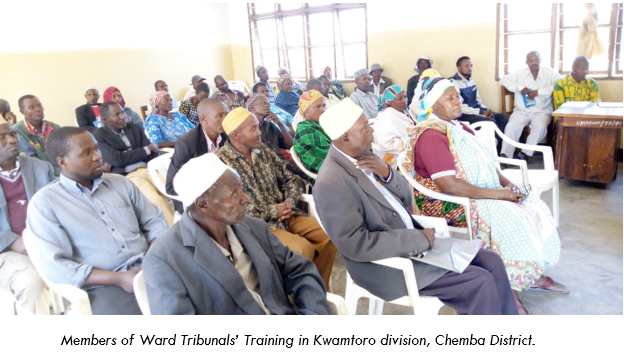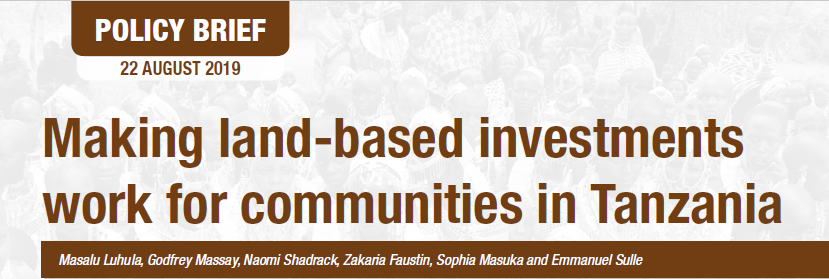WARD TRIBUNAL TRAINING IN IRINGA AND CHEMBA
wwwwwwwwwwwwwwwwwwwwwwwwwww.png

From 17th to 21st September 2018, Tanzania Natural Resource Forum (TNRF) through Land Governance and Accountability Project supported by Welthaus Graz and DKA Austria, conducted training for members of Village Land Councils and Ward Tribunals in Iringa Rural and Chemba Districts. The training was conducted in collaboration with District officials from Land and Legal departments of the respective District. The training also brought on board Ward Executive Officers (WEO), Village Executive Officers (VEO), members of farmers and pastoralists Loose coalition, Land Rights Monitors (LRMs) and UMAKWA (a community Based Organization in Kwamtoro) representatives.
The training was for nine Ward Tribunals: That means four in Iringa: Mboliboli, Itunundu, Mlenge and Ilolo Mpya and five in Chemba: Lalta, Kwamtoro, Lahoda, Ovada and Kinyamsindo Wards
Land Governance and Accountability is a three-year project that aims at among other objectives enhancing knowledge on land rights and facilitate access to justice. Therefore, the training intended to strengthen Ward Tribunals members, capacitate and reminding them their roles and power limitations as one of land dispute mechanism. This also looked at composition of the tribunals at the time of formation and during case determination to avoid unnecessary appeals. The training also enlightened the participants on the main features of the land laws, women land rights, and local governance system. Training on these topics gave a vast reflection of community needs on ensuring justices is done.
From the training many issues arose out of discussion. The following were the issues raised by the participants:
- Power interference and lack of independence: A complaint arose during training session that political leaders and government officials interfere with justice dispensation. A claim was said at Kwamtoro Ward, where the Ward Councilor and the Ward Executive Officer can come and take any file of their choice for a simple reason that they can handle it on behalf of the tribunal. In other circumstances, the members of Kinyamshindo Ward Tribunal were removed in office by a mere statement of the Ward Councilor at the meeting of parents at a Secondary School and in replace, the Councilor with other four members of the Ward Development Committee nominated other members of the tribunal. This all happened only because the tribunal refused to adhere to his instructions when determining cases.
- Poor governance: On other hand, it was said in some villages, Village Assemblies are not held accordingly. At Kinyamshindo village, it is three years now, the villagers have not been called for Village Assembly. The situation has caused serious problems in the village which includes poor administration and governance over village land and village council in daily services to the community. In other cases, the village chairperson sometimes hamlet leaders allocate land to non-villagers without following due process.
- Ignorance of law: Especially the Village Council. It is a matter of law that Village Council have no power to deliver judgments. It was discovered, the Village Land Council for Kwamtoro villager and other Councils deliver Judgements and these judgements are executed through the office of the Village Executive Office (VEO), worst enough, the Council awaits for approval from the VEO to start determining any dispute lodged.
- Disparity in charges for costs to visit land in dispute: Different Ward tribunals charges differently regardless of the fact that the distance might be the same. In other circumstances the charges are not realistic. It was said especially in Iringa, sometimes the Ward Tribunal can charge up to Tanzania shillings 250,000/- per visit. A best experience was discovered at Kwamtoro Ward Tribunal where the Tribunal done assessment of villages in the Ward and allocate charges depending on the distance where the highest charge is Tanzania shillings 10,000/- for transport and Tanzania shillings 10,000/- for meals to each member of the tribunal involved in the visit. The main cause for the disparity was caused by the Tribunals to treat the charges as source of their income.
- Lack of Motivation for members of Ward Tribunals. Members were not happy of the work being voluntary. In their opinion, the work is hard and therefore needs motivation otherwise members don’t feel concerned to commit time for the Tribunal. The District tribunal is also supposed to remit 75% of the revenues collected from the tribunals but sometimes this can take a year or more before it gets to the tribunals accounts and in some occasions sent through mobile transactions which keep making it minimal not enough for tribunals use. This financial challenge causes the tribunals to fail measurably as they miss necessary stationeries.
At the end of the training members from the tribunals selected two representatives from each Ward Tribunal (a man and a woman) as Tribunal Monitors of justices. These will be actives delegates to resolution entered by participants as take away. The resolutions entered included Resolutions:
- Put knowledge acquired into action to ensure justice,
- Maintain Integrity in their daily routine,
- Training other members who did not attend training. This includes also sharing manual/books.
- Set up standards on amount of money charged for visiting land in dispute
- Documenting and communicating to the Ward Development Committee, the office of the District Executive Director, District commissioner office and District Land and Housing Tribunal (DLHT) when files are forcefully taken by Political leaders, Ward Executive Officer as it is the practice especially in Chemba.

